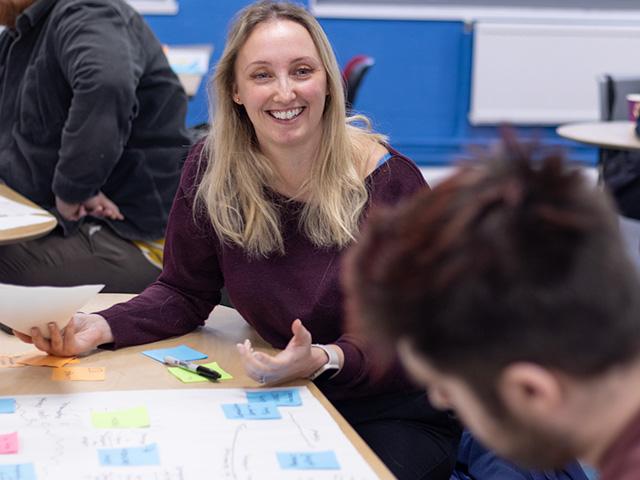We were joined by:
Dragos Leonte, Principal Business Analyst, Scottish Government
Lesley Jones and Fran Beadle, The Welsh Nursing Care Record, Digital Health and Care Wales
Ann Kempster, Head of Delivery, Centre for Digital Public Services
The panel highlighted how they have worked as part of multidisciplinary teams and what they’ve learnt as part of this process.
Agile Team Onions
Dragos discussed the practical elements of building a multidisciplinary team and described how he uses the Agile Team Onion model when approaching projects. The Agile Team Onion is a way of structuring a project team and enables a multidisciplinary team to invite people in as and when needed so there are less people working in isolation.
It is made up of 3 categories; the core, collaborators and supporters and emphasises the need to bring in the right people and skills at each stage of a project.
He gave us an insight into how this approach worked to develop a cloud-based migration system for public sector organisations in Scotland.
When asked his advice for teams that are new to this way of working, he said:
“Agile needs to be applied to an organisation with compromise, it may not be ideal to use pure Agile. We have to make it work for the teams we are in. We are following the principles, but not sticking to the Agile Manifesto.”
Involving users first
Lesley and Fran gave us an overview of how they worked as part of a multidisciplinary team to digitise Welsh nursing care records. From the outset, the needs of patients and nurses who would be using the system were at the forefront.
The multidisciplinary team identified the priorities, goals, and timeframes. By involving the nurses from the very beginning, they have designed a system which is easy to use, clear and saves time when working within a hospital environment.
Supporting the culture shift
Ann told us how CDPS is establishing multidisciplinary teams in each of the projects they are working on, including with Sport Wales, Natural Resources Wales, and the accessing adult social care project, working with local authorities. She also described how their training and communities of practice will support the culture shift needed to work in this way.
All panel members agreed that working with others and being flexible in your approach is essential to successful multidisciplinary team working.
In the discussion that followed, we covered a wide range of topics including:
whether COVID-19 and the move to virtual working has made it easier to set up multidisciplinary teams
the perceived barriers to working in this way and how to overcome them
advice to teams starting out on the Agile journey
Watch the webinar
